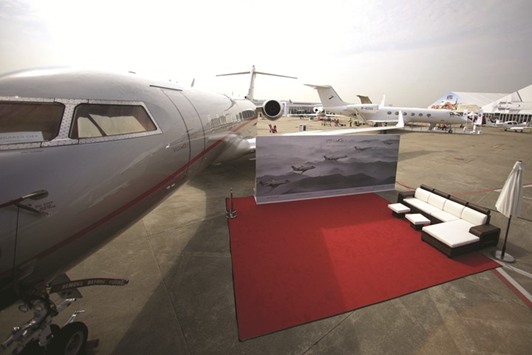China’s rich are foregoing fancy new private jets in favour of second-hand planes or rentals, reflecting how the country’s business elite are increasingly shunning flashy signs of wealth amid slower economic growth.
Planemakers such as Embraer and Bombardier are shifting focus to after-sales services in response, while brokers are refurbishing older jets or hiring out planes as the once high-flying industry braces for its weakest growth in a decade.
Dealers at one of Asia’s top industry shows in Shanghai this week said second-hand jets now made up more than half of sales to wealthy Chinese entrepreneurs and corporations, up from under a third two years ago. Chinese buyers, who began purchasing new business jets 30 years ago, were also becoming more pragmatic about buying cheaper, second-hand jets and giving them a makeover, they said.
“Now ... while you can still get a Gulfstream 550 for around $50mn for a new one, you can get an extremely adequate aeroplane for $30mn,” said David Dixon, president of business jet brokerage Jetcraft Asia. “So $20mn is a lot of money to anybody.”
In part the shift reflects a broader trend that is making life tougher for firms selling luxury goods in the world’s second biggest economy, as Chinese buyers increasingly push for bargains on everything from high-end handbags to holidays. In such a market, where new planes quickly lose their value, dealers said second-hand jets were simply a less risky bet.
“When the economic climate is going down, there’s fewer buyers in the market honestly, so the depreciation rate is higher,” said Jackie Wu, president of Hong Kong-based plane broker and charter firm JetSolution Aviation Group.
Greater China is the world’s second-largest business jet market behind the United States and had seen annual growth of up to 49% before 2012, when President Xi Jinping launched a fierce crackdown on corruption that has discouraged conspicuous displays of wealth.
Owners include China’s richest man, Wang Jianlin, who flies a Gulfstream 550, and Tencent founder Pony Ma who has a Bombardier Global 6000, according to data compiled by Hurun Report which tracks China’s super-rich.
But growth has been slowing since 2012 and sales remain subdued. At the Shanghai show there was a distinct lack of new orders announced, while planemakers instead talked up their after-sales service. Consultancy Asian Sky Group estimates the private jet fleet across Greater China will grow just 1% this year — with a total of five new plane deliveries— its weakest on record.
There are currently around 480 private jets in China, compared with 466 in 2015 and 67 in 2007. “The entire market is now experiencing a cold wind,” said Guan Dongyuan, president of Embraer China. Guan said, however, that the Brazilian planemaker was holding out for better days, given the potential of a market that is still a long way behind the United States, where there are around 12,000 private jets.

A VistaJet aircraft is seen at the Asian Business Aviation Conference and Exhibition (ABACE) at Hongqiao International Airport in Shanghai, China, earlier this week.
